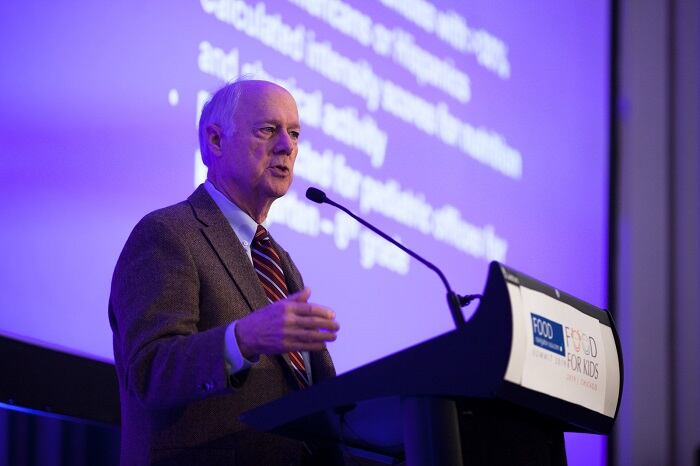Currently, many companies focus their corporate social responsibility efforts on environmental sustainability as a way to protect key ingredients, expand access to new biodiverse ingredients that can inspire innovation and consumer engagement, or produce products more efficiently at a lower long-term cost. Alternatively, many companies’ CSR campaigns focus on providing quality nutrition – often in the form of decreasing nutrients of concern or expanding access to nutrient dense foods in underserved populations.
And while these are all laudable goals, they do not exist in isolation naturally as they do in many companies three to five year plans. Rather, they are part of a much larger, more complicated picture that brings together the health of the planet, the health of consumers and the health of corporations, according to William Dietz, chair of the Sumner M. Redstone Center for Prevent and Wellness at The George Washington University Milken Institute School of Public Health.
He told attendees at FoodNavigator-USA’s Food For Kids Summit in Chicago late last month that if corporations want to address the current threat of climate change and nutrition-related disease in a meaningful manner they must look at them together as a “global syndemic of obesity, undernutrition and climate change.”
Defining a syndemic
Pointing to a Lancet Commission report published in January that he co-chaired, ‘The Global Syndemic of Obesity, Undernutrition, and Climate Change,’ he explained that “a syndemic is an interaction of two or more pandemics, which interact in time and place and have negative effects on each other.”
And if climate change is considered a pandemic alongside obesity and undernutrition, it is easy to see how the three are magnifying each other’s negative effects – especially in lower-income countries where there is a prevalence of 10-15% of children who are both obese and stunted from malnutrition.
“Obesity contributes to climate change because it drives up overconsumption, which is associated with overproduction. And climate change affects under nutrition because of its impact on crop yields, both in terms of protein content in crops as well as the micronutrient content of crops, and also because of the extraordinary adverse events of climate change in terms of flooding and fires,” he said.
He added that the current demand of the food system on land use, urban design and transport further fuels the problems with each element of this triumvirate.
For example, he explained, “on the food side, beef production is associated with increased methane, which is a very significant greenhouse gas, and is associated with obesity and cardiovascular disease, and the increase of greenhouse gas further contributes to the undernutrition in the developing world.”
On the transport and land use side, he added, increasing reliance on cars drives up carbon dioxide production and displaces physical activity, which contributes to obesity, and the increase in greenhouse gas contributes to undernutrition.
A call to action
“So, how can we begin to reverse these,” he asked attendees at the Food For Kids Summit. “We have got to change the way the food system operates and that is not an easy task. It begins with our behavior and our patterns of meat consumption, our own patterns of physical activity,” which once addressed should have “beneficial effects on our global pandemic.”
While Dietz said he knows that this is asking a lot of many people, he also said he already sees “promising developments that contribute to the mitigation of climate change” and the larger syndemic.
For example, he pointed to the increased adoption of a flexitarian, vegetarian and vegan diets and momentum behind many popular meat alternatives, which he noted “are good for the planet, but not yet good for the health because many have high levels of saturated fat and salt.”
He also noted the growth of better-for-you products now exceeds the growth of products that are not sustainably produced as reflected in part in the 5% increase in annual sales of sustainably produced products.
Another stealth intervention worthy of broader support is increased access to public transportation and physical transportation, such as biking or walking, which offer environmental benefits as well as direct health benefits.
With these examples in mind, Dietz said he feels “optimistic,” but he also said he fears that these developments may not move at a fast enough rate to reverse and mitigate climate change.
Which is why it is necessary that food manufacturers with active CSR campaigns expand their scope to not focus only on the low-lying fruit related to the environment or consumer health in isolation, but to look at them together more holistically and develop higher level solutions.

